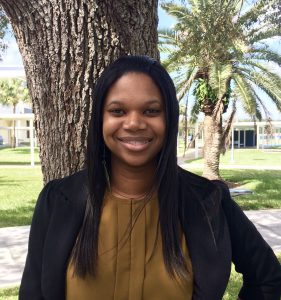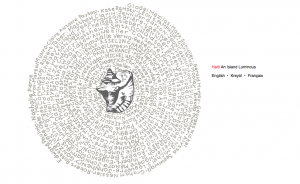Digital Scholarship @ FIU: an interview with Dr. Hadassah St. Hubert
As part of our new series getting to know the digital scholars of FIU, we sat down with Dr. Hadassah St. Hubert, CLIR Postdoctoral Fellow at the Digital Library of the Caribbean (dLOC), to talk about her experiences with digital humanities projects and digital scholarship tools

What are your research interests?
I finished up my PhD in History at the University of Miami last year, 2018, and my research looked at Haiti’s participation in World’s Fairs and Expositions. I did a good portion of my research at the Wolfsonian-FIU Museum, which has an extensive World’s Fairs collection.
What are some favorite digital humanities projects that you have worked on?
My first DH project, and the largest DH project I’ve worked on was Haiti: An Island Luminous. We–Adam Silvia, Brooke Wooldridge, and myself– recruited about 100 or so different scholars to build a website to give context to Haitian history. After the 2010 earthquake we wanted to let people know that there are archives in Haiti where you can do research. We need to support them and help them build capacity.
And what a great way to do that–to create a website that features commentary from scholars, coupled with scanned archival information from Haiti, and other Digital Library of the Caribbean partners–to create an online Haitian history platform. We were very successful with that and we got it translated into Haitian Creole and French as well so that way we could have a lot more community engagement. We put kiosks at the Little Haiti Cultural Center, Nova Southeastern Museum, and more recently, in early May, we put a new one at North Miami Public Library, which is a more central home for the Haitian community.
And we’ve gotten great feedback. A lot of people have come up to me and said “I use this to teach my kids French and Creole!” So, they’re using this in different ways, and using it for K-12 teaching material. Sant La Neighborhood Community Center has the kiosk that was formally at Nova Southeastern Museum and they’ve been using it a lot for neighborhood outreach–so people are getting engaged with Haitian history.
That was the biggest DH project I’ve worked on. I started working on it in 2011 and we didn’t launch until 2014. Translations were done in early 2016 and we launched the translation portion at the Haitian Studies Association Conference which was held in Cap-Haïtien, Haiti. It took a lot of work and was a large collaborative project, which is different than the single authored books and articles that most historians are typically used to doing. Collaborative work is a reason why I like creating digital humanities projects. As historians we tend to do single monograph focused research, but putting other narratives in touch with each other gives people a more complete context of different situations and histories.
What are some tools or resources in digital humanities that you like or would recommend?
My favorites have been TimelineJS and StoryMapJS. Yes, because they are free, but also the learning curve isn’t as high. I think a lot of times in digital humanities there is this inclination to believe that you have to be super tech savvy, you have to know how to code, you have to know how to use Jekyll, and so on, and so forth. But with TimelineJS and StoryMapJS you can easily integrate them into the classroom. You can actually use them in assignments to make sure that your students are reading the materials, because they have to create a narrative. As a historian, that’s obviously the best thing for me–helping people create new narratives, addressing gaps in history and telling stories that haven’t been told before.
What is one thing you would like people to know about digital humanities or digital scholarship?
That anyone can do it! I do very much feel like there is this idea that “oh DH, it’s this new thing” and “it’s other people who are more tech savvy that use it.” But you don’t have to be tech savvy to use it. There are very simple ways to do DH. If you work on Excel sheets you can learn how to create a digital humanities website. It is as simple as first starting with the spreadsheet, making sure that your information is saved correctly so that there is long-term sustainability and this information survives. You can easily integrate DH into your own research and into your classroom as well. I feel like the major hump that we have as digital humanists is communicating that DH is not that hard to incorporate into your research. And in the classroom, it actually gets students to participate in different ways, rather than the traditional lecture format. You can encourage students to be tech savvy and create narratives, because it incorporates heavy writing processes as well. So yes, it’s great! You can learn it, and there are people available to teach it!

